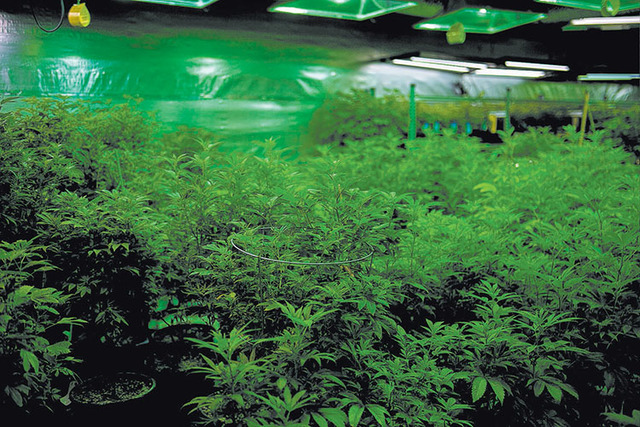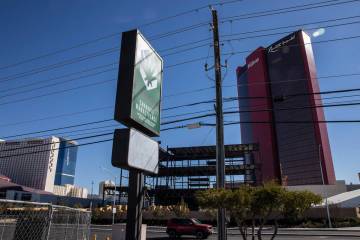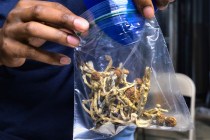Casino industry leaders don’t see recreational marijuana as major tourism boost
You won’t see the casino industry leading the charge for passage of Question 2, Nevada’s recreational marijuana initiative.
Odds are you also won’t see resorts sponsoring gatherings involving cannabis use or allowing guests to smoke in their rooms.
That’s because the state Gaming Control Board, which regulates the gaming industry in Nevada, has been quite public about its concern that marijuana possession will remain a federal crime even if Question 2 is approved by voters Tuesday. Promoting marijuana use could be perceived as flouting federal statutes.
The potential for federal prosecution helps explain why casino companies and the Nevada Resort Association won’t support Question 2 — and why they won’t talk about recreational marijuana’s potential effects on tourism and conventions.
The Control Board first took a stance on marijuana use when the state was debating the merits of medical marijuana. The board wanted to make it clear to the industry where it stood on pot use, and on May 6, 2014, chairman A.G. Burnett’s colleague on the Control Board, Terry Johnson, issued a notice to licensees and applicants making the regulatory environment clear.
“While the Nevada Legislature has made certain medical marijuana establishments legal, the Controlled Substances Act makes it illegal under federal law to manufacture, distribute, dispense or possess marijuana,” he said.
Johnson explained that the board is directed to make judgments on the character and integrity of licensees and applicants and whether their actions discredit the state or the gaming industry.
“Accordingly, unless the federal law is changed, the board does not believe investment or any other involvement in a medical marijuana facility or establishment by a person who has received a gaming approval or has applied for a gaming approval is consistent with the effective regulation of gaming,” Johnson said. “Further, the board believes that any such investment or involvement by gaming licensees or applicants would tend to reflect discredit upon gaming in the state of Nevada.”
INDUSTRY CHILL
That sent a chill through the industry. Burnett has made it clear that the board’s position is no different on recreational marijuana, so most of the industry won’t support Question 2, which would decriminalize the recreational use of marijuana by those 21 and older.
“Marijuana use and possession is still illegal under federal law,” said Virginia Valentine, president of the Nevada Resort Association.
Valentine said because NRA members hold privileged, nonrestricted gaming licenses and the Control Board has voiced its concern about licensees participating in the marijuana industry, the association opted to oppose passage of Question 2.
“While we have taken a position on the issue, the association is not directly involved with the campaign (opposing Question 2),” she said. “But members may choose to support the campaign against passage in their individual capacities.”
And some of them have.
According to election contributions and expense reports filed in October with Secretary of State Barbara Cegavske’s office, six gaming companies or their executives — five from Southern Nevada — have contributed to Protecting Nevada’s Children, a political action committee formed to oppose Question 2.
The PAC has raised $2.09 million, the bulk of it from Las Vegas Sands Corp. Chairman and CEO Sheldon Adelson, who donated $2 million. Other contributions were made by South Point Hotel Casino ($50,000), MGM Resorts International ($25,000), Boyd Gaming Corp. ($10,000), Green Valley Ranch Resort ($1,500) and the Atlantis Casino & Resort in Reno ($1,000).
“We oppose passage of Question 2 in that a gaming license is a privileged license in Nevada and licensees are held to very strict standards,” MGM Resorts International spokesman Gordon Absher said. “The primary concern for us is that marijuana use and possession is still illegal under federal law.”
Absher confirmed that the company contributed to the anti-Question 2 effort and recommended a no vote in the company’s in-house voting guide.
TOURISM IMPACT
Would marijuana legalization help or hurt Southern Nevada tourism?
The Las Vegas Convention and Visitors Authority, which typically keeps itself off the political battlefield, isn’t saying one way or the other whether more visitors would travel to Southern Nevada if voters approve Question 2 on Tuesday.
Additionally, representatives of the producers of two of Las Vegas’ largest annual conventions won’t comment on the marijuana initiative and won’t say whether they would consider having their trade shows elsewhere should the initiative pass.
Karen Chupka, senior vice president of corporate business strategy for International CES and the Consumer Technology Association, producers of the massive CES show every January, had no comment.
Likewise, Chris Brown of the National Association of Broadcasters, which brings more than 100,000 people to Las Vegas every spring, said his association won’t weigh in.
The Nevada Resort Association’s Valentine and Ron Reese, a spokesman for resort and convention center operator Las Vegas Sands Corp., say they aren’t assessing the potential tourism impact because they’re focused on defeating Question 2.
“It’s putting the cart before the horse,” Reese said. “It’s obvious the industry is aligned against it.”
Valentine said there are so many other draws to Las Vegas — entertainment, restaurants, shopping and gambling — that the attraction of legal marijuana would be marginal at best. Besides, she said, voters could legalize recreational marijuana in several other states Tuesday, including neighboring California and Arizona, negating any positives for Nevada.
COLORADO LESSONS
Recreational marijuana already is legal in Colorado, Washington, Oregon and Alaska. Legal pot has affected tourism and convention business in Colorado.
In Denver, visitation in 2015 climbed by about 1 million people over the previous year.
A recent study by Indianapolis-based Strategic Marketing & Research Insights found that during the winter of 2015-2016, 4 percent of Colorado tourists surveyed said legal marijuana motivated their trip to Colorado; 7 percent said it was in their top three reasons for traveling to Colorado; and 12 percent visited a dispensary while traveling to Colorado, according to a Denver Post report.
But Visit Denver, the local government’s marketing arm, drafted a scathing report in December 2015 after receiving several complaints from convention planners about conditions in the downtown area.
Most of the complaints referred to the visible homeless population, public marijuana use and overall conditions at downtown’s 16th Street Mall.
In emails to Visit Denver, planners called the area “dirty,” “smelly” and “depressing,” and said they were taking their conventions elsewhere.
But at least one tourism expert says recreational pot won’t be a detriment to Las Vegas. She envisions cannabis rooms opening in the same way that cigar bars have flourished to keep marijuana away from guests who don’t want to be exposed to it.
“People come here to party,” said Patti Shock, a tourism professor emeritus at UNLV. “That is a large part of the appeal of Las Vegas. Look at the appeal of Amsterdam or Jamaica. Cannabis users are no longer the stereotype of the stoner on the sofa. They are from all socioeconomic and cultural levels.”
Jimmy Stracner heads Protecting Nevada’s Children PAC, which opposes Question 2. He said the long-term effect on tourism would be bad for the state, even if the legalization of recreational pot initially draws large numbers of people to the state.
“It’s indisputable that there was a spike in tourism in Colorado when it was first approved, so it seems logical that tourism would benefit,” Stracner said.
“But after 2012, people in Denver, especially conventioneers, felt unsafe because there were more people who looked homeless, like vagabonds, and people visiting had a bad taste in their mouths.”
He said the short-term bump in visitation numbers wouldn’t be worth the declines that would occur after the novelty wore off.
The Review-Journal is owned by the family of Las Vegas Sands Corp. Chairman and CEO Sheldon Adelson.
Contact Richard N. Velotta at rvelotta@reviewjournal.com or 702-477-3893. Follow @RickVelotta on Twitter.






















